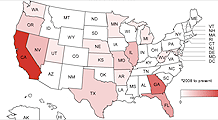Opposition mounts for Obama's consumer plan
Proponents of plan to protect consumers of financial products have called a timeout. Fed doesn't like the idea, but top Democrats are pushing hard.
WASHINGTON (CNNMoney.com) -- One of the signature proposals in the Obama administration's efforts to reshape the regulatory framework for banks has been slowed as supporters regroup in the midst of mounting opposition.
The creation of a new consumer protection agency to regulate mortgages, credit cards and credit insurance was never going to be easy. But the forces trying to stop or water down the proposal have grown beyond banks and financial sector lobbyists.
Federal Reserve Chairman Ben Bernanke, testifying Wednesday before the Senate Banking Committee, argued strongly that the central bank should keep its consumer protection powers, which would otherwise move to the new agency.
Bernanke also suggested that Congress take steps to elevate consumer protection to a more prominent role at the Fed.
Fed leaders have been making their case behind the scenes for weeks. Bernanke's comments represented the Fed's most high-profile public opposition to a stand-alone consumer agency.
The push-back has prompted top Democrats supporting the consumer agency to change strategies.
House Financial Services Chairman Barney Frank, D-Mass., said he would delay pushing for a vote on the consumer agency bill until September, in part to give top Democrats more time to win more support in Congress and outside of Washington.
"This became somewhat more controversial than I expected," Frank said Wednesday at a press conference with consumer advocates. "I believe the votes were there, on the part of the Democrats, to put it through. Even a few Republicans or two had talked about it ... but this is worthy of an actual debate."
How it would work: The Consumer Financial Protection Agency would be run by a presidentially-appointed, five member board and would wield broad power, including the ability to examine and subpoena information from banks.
A main task of the new agency would be to create simple templates for basic financial products, such as fixed-rate, 30-year mortgages. All banks and mortgage brokers would have to offer the simpler product and use an agency-approved standard, one-page application. More complicated mortgages would have to spell out how they differ from the simpler "plain-vanilla" financial product.
The agency would also have the power to ban products deemed deceptive. That has prompted critics to warn that the new agency could stifle innovation in financial products and make credit less available for consumers.
The debate: The financial services sector has come out swinging against the proposed new agency.
The head of the Financial Services Roundtable, a powerful lobbying group representing Wall Street, has talked publicly about efforts to kill the proposal. On Wednesday, the U.S. Chamber of Commerce issued a press release praising the delay of the "flawed" proposal.
Lawmakers opposed to the plan are also speaking out.
"I think this is a tremendous overreach and very disturbing to listen to," said Sen. Bob Corker, R-Tenn., last week during a hearing on the new consumer panel. "And I hope that as [the bill goes forward], we will be able to work together to do something that is not an overreach, where the federal government is telling citizens the types of products they should and shouldn't buy and telling companies what they should and shouldn't offer."
On the other side of the debate, the Treasury Department joined in the public campaign Wednesday. Deputy Treasury Secretary Neal Wolin pressed for the new agency at a meeting of the American Bankers Association, which is strongly opposed to the idea.
"The agency will not limit consumers' ability to choose the products they want," Wolin said. "Quite the contrary, our proposed legislation explicitly charges the CFPA with preventing abusive and unfair practices and, at the same time, promoting efficiency, innovation and consumer access to financial services."
Fed pushback: On Wednesday, Bernanke added his voice to the list of those trying to reshape the proposal.
While agreeing the Fed was not "aggressive enough to address consumer issues earlier in this decade," Bernanke defended the Fed's role as an advocate for consumers.
"We have the capacity, we have the ability [and] we have the expertise ... to be effective when we are working in that direction," Bernanke said.
He recommended that Congress rewrite the Federal Reserve Act to elevate consumer protection as a "major goal" of the Fed, equal in importance to assuring full employment and price stability.
The Fed chairman could report regularly on how they're monitoring consumer protection -- similar to monetary policy updates, Bernanke said. He suggested Congress could hold hearings to question how the Fed is addressing consumer protection.
Bernanke also suggested beefing up the Fed's Consumer Advisory Council, giving the group more power and requiring it to meet more often. Currently, the 30-member council comprises industry and consumer representatives and meets three times a year. Yet, its authority is limited to advising the Federal Reserve Board.
"I think there are steps that could strengthen the institutional framework that would address your legitimate concern about the long-term commitment of the Fed to this particular area," Bernanke said.
Campaign continues: While Bernanke testified, on the opposite side of the Capitol, House financial leaders, including Frank and Rep. Maxine Waters, D-Calif., held a press conference with a new group organized last month to push for the new consumer agency.
Americans for Financial Reform is comprised of union and consumer advocate groups. It has also signed on a few financial firms to its cause.
The coalition was the brainchild of consumer groups disappointed with their failure to convince Congress to pass a measure that would have allowed judges to modify underwater mortgages, a move successfully blocked by the financial sector industry. ![]()


